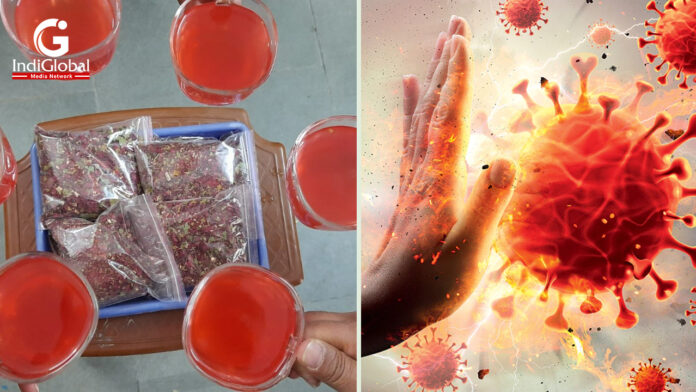 Researchers from the IIT Mandi and The International Centre for Genetic Engineering and Biotechnology (ICGEB), New Delhi, have identified Phytochemicals in the petals of a Himalayan plant that could potentially be used to treat COVID-19 infections.
Researchers from the IIT Mandi and The International Centre for Genetic Engineering and Biotechnology (ICGEB), New Delhi, have identified Phytochemicals in the petals of a Himalayan plant that could potentially be used to treat COVID-19 infections.
The findings of the research team have been recently published in the journal ‘Biomolecular Structure and Dynamics’. The research was led by Dr Shyam Kumar Masakapalli, Associate Professor, BioX Centre, School of Basic Science, IIT Mandi and Dr Ranjan Nanda, Translational Health Group and Dr Sujatha Sunil, Vector Borne Disease Group, International Centre for Genetic Engineering and Biotechnology, New Delhi. The paper has been co-authored by Dr Maneesh Lingwan, Ms Shagun Shagun, Ms Falak Pahwa, Mr Ankit Kumar, Mr Dileep Kumar Verma, Mr Yogesh Pant, Mr Lingarao V. K. Kamatam and Ms. Bandna Kumari.
 Two years into the COVID-19 pandemic, the researchers are trying to understand the nature of the virus and discovering new ways to prevent the infection. While vaccination is one route to providing the body with the fighting power against the virus, there is a worldwide search for non-vaccine medicines that can prevent viral invasion of the human body. These medicines use chemicals that either bind to the receptors in our body cells and prevent the virus from entering them or act on the virus itself and prevent its replication inside our bodies.
Two years into the COVID-19 pandemic, the researchers are trying to understand the nature of the virus and discovering new ways to prevent the infection. While vaccination is one route to providing the body with the fighting power against the virus, there is a worldwide search for non-vaccine medicines that can prevent viral invasion of the human body. These medicines use chemicals that either bind to the receptors in our body cells and prevent the virus from entering them or act on the virus itself and prevent its replication inside our bodies.
 Dr Shyam Kumar Masakapalli, Associate Professor, BioX Centre, School of Basic Science, IIT Mandi, says, “Among the different types of therapeutic agents being studied, phytochemicals – chemicals derived from plants – are considered particularly promising because of their synergistic activity and natural source with fewer toxicity issues. We are hunting for promising molecules from the Himalayan flora using multi-disciplinary approaches”
Dr Shyam Kumar Masakapalli, Associate Professor, BioX Centre, School of Basic Science, IIT Mandi, says, “Among the different types of therapeutic agents being studied, phytochemicals – chemicals derived from plants – are considered particularly promising because of their synergistic activity and natural source with fewer toxicity issues. We are hunting for promising molecules from the Himalayan flora using multi-disciplinary approaches”
Dr Ranjan Nanda, Translational Health Group, International Centre for Genetic Engineering and Biotechnology, New Delhi, says, “We have profiled and investigated the phytochemicals of Rhododendron arboreum petals sourced from Himalayan flora and have found it to be a promising candidate against the COVID virus.”
 Dr Sujatha Sunil, Vector Borne Disease Group, International Centre for Genetic Engineering and Biotechnology, New Delhi, says, “A combination of the phytochemical profiling, computer simulations and in vitro antiviral assays showed that the extracts from the Buransh petals inhibited the replication of the COVID-19 virus in a dose-dependent manner.”
Dr Sujatha Sunil, Vector Borne Disease Group, International Centre for Genetic Engineering and Biotechnology, New Delhi, says, “A combination of the phytochemical profiling, computer simulations and in vitro antiviral assays showed that the extracts from the Buransh petals inhibited the replication of the COVID-19 virus in a dose-dependent manner.”
The findings support the urgent need for further scientific studies aimed at finding specific bioactive drug candidates from R. arboreum, in vivo and clinical trials against COVID-19. The research team also plans to carry out additional studies to understand the precise mechanism of inhibition of COVID-19 replication by specific phytochemicals from Buransh petals.








